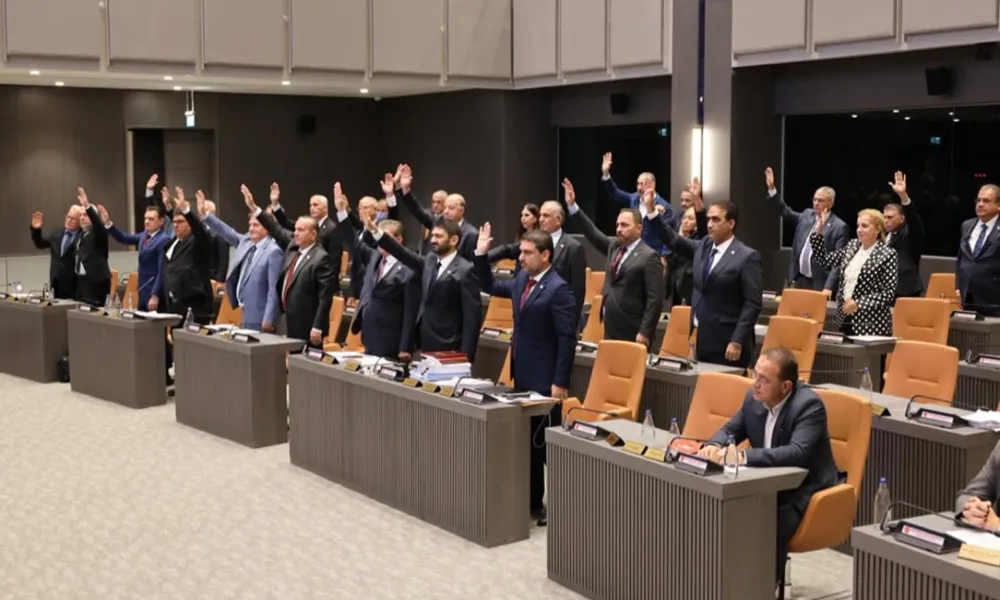By Christos Georgiou
With just days to go before Sunday’s Turkish Cypriot leadership election, Ersin Tatar has placed the spotlight on a new resolution passed by the north’s “parliament,” declaring support for a two-state solution to the Cyprus problem.
The motion, approved late Tuesday by members of the ruling coalition, has no binding effect but has already stirred controversy across the political spectrum. Opposition parties refused to take part, accusing Tatar’s government of exploiting the issue for electoral gain.
The resolution was passed by a show of hands, with members of the ruling coalition voting in favour and the opposition refusing to participate. MPs from the three parties in the ruling coalition, the National Unity Party (UBP), the Rebirth Party (YDP), and the Democratic Party (DP) raised their hands in support. Opposition parties boycotted the vote, calling it a political manoeuvre staged just five days before Sunday’s leadership election.
A symbolic move before the vote
Despite the rhetoric, the resolution has no practical consequences. It is not binding and is widely seen as a symbolic gesture designed to consolidate nationalist support for Tatar in the final stretch of his campaign. Opposition MPs described it as a “manufactured debate” aimed at diverting attention from economic and governance issues dominating the pre-election climate.
Tatar claims a “historic decision”
Ersin Tatar immediately seized on the development, describing it as a “historic decision that will determine the future of our state and our national cause.” Speaking at a campaign rally, he said the vote “strengthens the political agenda” he has been promoting throughout his tenure, that a two-state solution represents the only viable path forward after years of failed reunification talks.
“Our people know very well that this is not an ordinary political choice,” Tatar said. “It is a moment of destiny.”
He accused opposition leader Tufan Erhürman of “failing to stand with the majority” after his Republican Turkish Party (CTP) walked out of the vote. “Things would have been different if everyone had supported the two-state policy as I do,” Tatar said, claiming that public opinion polls show “a large majority” in the north now favour such an approach.
Reactions from the opposition
CTP leader Tufan Erhürman said the decision “binds only the government, not the presidency,” emphasising that the office of the TC leader retains the authority to conduct negotiations. “It does not override the 1983 declaration of independence,” he said, rejecting claims that a new administration would be unable to discuss a federal framework.
Still, the resolution has added political tension to an already polarised contest. Rebirth Party leader Erhan Arıklı, one of Tatar’s allies, warned that if Erhürman wins, “there will be a problem with the government,” claiming it would lack the authority to engage in any talks on a federal basis due to parliament’s decision. “If necessary,” he added, “this authority will be withdrawn from him.”
Erhürman dismissed the remarks as “baseless,” accusing the ruling coalition of exploiting national issues for electoral gain.
A deeper political intent?
According to political and economic analyst Mertkan Hamit, the move could mark the start of a shift in the Turkish Cypriot narrative towards a “Turkish Cyprus State.”
He drew a parallel with events leading up to the unilateral declaration of independence (UDI) in 1983. “In January that year, the Turkish Federated State of Cyprus passed a regulation on self-determination that became the foundation stone of the UDI ten months later,” Hamit recalled. While the declaration was condemned by the UN Security Council, he noted that “Turkey was a much more isolated actor back then, the power dynamics are different now.”
Hamit warned that if Tatar is re-elected, he will likely “invite international actors to talk about the new realities on the island,” taking clearer steps towards a permanent division.
